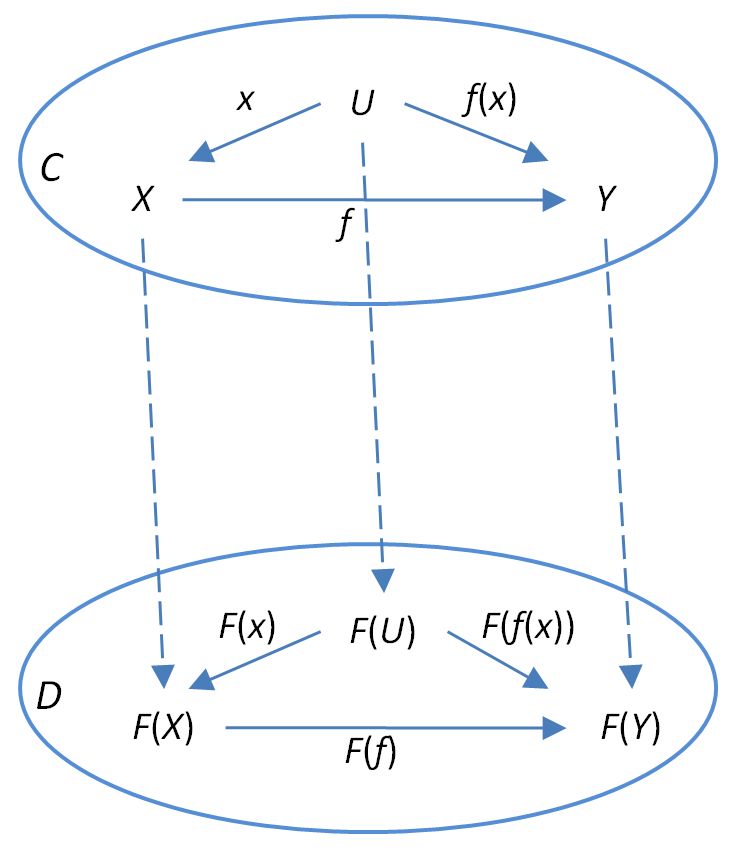http://ncatlab.org/nlab/show/experimental+alternative+definition+of+functor
We can have a definition "functor" in Mathematics
In category theory, a branch of mathematics, a functor is a special type of mapping between categories. Functors can be thought of as homomorphisms between categories, ormorphisms when in the category of small categories.
Definition
Let C and D be categories. A functor F from C to D is a mapping that[3]
- associates to each object
 an object
an object  ,
, - associates to each morphism
 a morphism
a morphism  such that the following two conditions hold:
such that the following two conditions hold: for every object
for every object 
 for all morphisms
for all morphisms  and
and 
That is, functors must preserve identity morphisms and composition of morphisms.
Functor in Computer Science
A function object, also called a functor, functional, or functionoid,[1] is a computer programming construct allowing an object to be invoked or called as though it were an ordinaryfunction, usually with the same syntax.
Description
A typical use of a function object is in writing callback functions. A callback in procedural languages, such as C, may be performed by using function pointers. However it can be difficult or awkward to pass a state into or out of the callback function. This restriction also inhibits more dynamic behavior of the function. A function object solves those problems since the function is really a façade for a full object, thus it carries its own state.
Many modern languages (and some older) e.g. C++, Lisp, Perl, PHP, Python, Ruby, and many others, support first-class function objects and may even make significant use of them.Functional programming languages additionally support closures, i.e. first-class functions which can 'close over' variables in their surrounding environment at creation time. During compilation, a transformation known as lambda lifting converts the closures into function objects.
In Java http://userpages.umbc.edu/~tarr/dp/lectures/Command-2pp.pdf
List<String> list = Arrays.asList("10", "1", "20", "11", "21", "12"); Comparator<String> numStringComparator = new Comparator<String>() { public int compare(String o1, String o2) { return Integer.valueOf(o1).compareTo(Integer.valueOf(o2)); } }; Collections.sort(list, numStringComparator);
In JavaScript:
E.g: First-class functor
var A = function(){ this.message = "hello"; };
var B = function(f) { this.sayHi = function(){ console.log(f.message); }; }
var a = new A();
var b = new B(a);
b.sayHi();
Functor return functor with closure:
function Accumulator(start) { var current = start; return function (x) { current += x; return current; }; }
var a = Accumulator(4); var x = a(5); //x has value 9 x = a(2); //x has value 11
In Programming, we can think a functor is a function that can be manipulated as an object, or an object representing a single, generic function. Functors support and encourage a number of powerful programming techniques including:
- programming in a functional style
- higher order functions
- internal iterators
- reuse and specialization through composition rather than inheritance and overloading
- generic "callback" or "extension point" APIs
- generic "filters" or predicate APIs
- many "behavioral" design patterns, such as Visitor, Strategy, Chain of Responsibility, etc.
What is an Active Functor?
It's the abstraction of how a computer program can create, pass, call and receive a functor (the definition and model to create instances) in real-time.
It's, functor can be think as a simple agent can receive data, processing and return a value.
It's, functor can be think as a simple agent can receive data, processing and return a value.
The "Active" mean a functor can be pulled/pushed to executing environment, like a web browser, Virtual Machine, ...
Currently, I will implement and introduce this power abstraction in web browser, and with popular tools like browser, JavaScript, Java VM. This can be implemented and put it into practice.
We know, Android, Java Virtual Machine, web browser, and the Cloud Computing, they already for us.
It's time to think we can make a true "Intelligent Social Cloud Computing".
A functor can be created by everyone in web browser, can travel from PC to Smartphone, or can be stored in the cloud storage.
Before going to the more higher level like http://activeinfograph.blogspot.com/ , that a program with anonymous functor running.
I think this could a functor framework can be easily implemented. And then with the AI and Machine Learning techniques, an active agent can go into practice.
http://brownsharpie.courtneygibbons.org/?cat=51
I think this could a functor framework can be easily implemented. And then with the AI and Machine Learning techniques, an active agent can go into practice.
http://brownsharpie.courtneygibbons.org/?cat=51


No comments:
Post a Comment